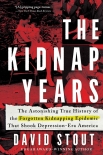The Kidnap Years:, David Stout [readict .txt] 📗

- Author: David Stout
Book online «The Kidnap Years:, David Stout [readict .txt] 📗». Author David Stout
Handsome, with wavy hair and dark, deep-set eyes, Reed looked like an aristocrat. In fact, he had grown up poor, one of six children born to farm parents in Ohio. The family moved to Iowa when Reed was a young boy, and his father died when Reed was eight. He attended high school irregularly yet managed to become a lawyer by studying law books he bought from the sale of a horse.
He started a law practice in Kansas City in his late twenties and was appointed Jackson County counselor in 1896. Two years later, he was elected county prosecutor. Reed served in that post for just two years before the Pendergast machine tapped him to run for mayor in 1900. (Perhaps Pendergast thought it safer not to have Reed in the prosecutor’s office, where he had won convictions in all but two of the 287 cases he brought to trial.)
Reed served a term as mayor and was elected to the Senate in 1910. He was briefly a candidate for president in 1924 and again in 1928, when he decided not to run for a fourth term in the Senate.
In his years in Washington, Reed never forgot the folks back home. He wrote dozens of letters of recommendation for people seeking patronage jobs in the Pendergast operation. Inevitably, then, he knew people who were frowned upon by good-government purists.
One of Reed’s acquaintances was a man named John Lazia. With his glasses, receding hairline, and prominent jowls, “Brother John” Lazia, as he was sometimes called, might have passed for a school principal or perhaps an accountant or an insurance salesman.
The appearance was misleading. Having fled the boredom of school in the eighth grade, Lazia became a street thug. While still a young man, he was sentenced to twelve years in prison for armed robbery. But Tom Pendergast had an eye for talent and helped Lazia obtain parole after less than a year. In return, the authorities wanted Lazia to join the army.
But Pendergast wanted Lazia in his army. Lazia became a Pendergast loyalist and by his early thirties was a bootlegger, owner of a soft drink company and a bail bond company, and operator of several gambling resorts. (Pendergast also used his influence to get lenient treatment for Lazia on tax-evasion charges.)
“Brother John” was head of the city’s Northside Democratic Club and acted as a “get out the vote” organizer in Italian neighborhoods for Pendergast-machine candidates. Lazia also had influence over hiring and firing in the Kansas City Police Department.
After Nell Donnelly was kidnapped, Reed wasted no time phoning John Lazia, with whom he was well acquainted. We can never know exactly what Reed said, but we can be sure of the gist of it: “Nell has been kidnapped, and I need the help of your gangsters to find her and bring her home. And don’t worry about the police.” With the police on the sidelines, Lazia dispatched search parties. Within hours, his men had found a restaurateur they suspected had knowledge of the kidnappers. The Lazia men used their considerable powers of persuasion on the restaurant operator and were soon on their way to the farmhouse where Nell Donnelly and her chauffeur were being held.
Guns at the ready, Lazia’s men barged into the farmhouse, found Donnelly, and informed her out-of-town captors that they had made a big, big mistake. Perhaps acting on orders, Lazia’s men exercised compassion and did not kill the abductors.
Donnelly and her chauffeur were driven to Kansas City, where they were dropped off. They had coffee at an all-night café before making their way home. Their ordeal had lasted a day and a half, and they had been freed with no ransom having been paid.
Before long, several suspects were arrested, likely with tips provided by Lazia’s operatives. Two men were convicted and given life sentences; a third got thirty-five years.
So the kidnapping of Nell Donnelly had a happy ending (except for the kidnappers). And yet there was an unsettling message. James A. Reed, former U.S. senator, former Kansas City mayor, former prosecutor, hadn’t called the police in the moment of crisis. Instead, he had called on a known mobster.
Would the relatives of other kidnapping victims be tempted to do the same? The kidnapping and rescue of Nell Donnelly had gotten a lot of press coverage. What kind of message did the episode convey? Nothing very good.
By this time, in Kansas City and other big cities, gangsters were becoming a second arm of government—helping the political parties select candidates, helping the police hire, fire, and promote. They acted as unofficial chambers of commerce in some places, welcoming gangsters visiting from other cities as long as the visitors paid deference and sometimes tribute.
How had all this come about? Machine politics had sprouted and thrived in many cities, in part because clubhouse politicians offered jobs and services to immigrants. Then came Prohibition. Millions of law-abiding Americans still wanted to drink and not always in speakeasies. If an honest American wanted a steady supply of top-shelf liquor and wine to sip in the living room or serve to dinner guests, he couldn’t rely only on the neighborhood druggist. He needed a reliably civilized distributor or salesman, preferably someone who was friendly and nonthreatening.
And if an honest American wanted to gamble in an area where gambling was officially illegal, that was another recreation provided by gangsters—another “service,” as it were. Inevitably, with so much cash sloshing around, some of it flowed to city hall and the precinct house. The pols and the police, after all, felt entitled to their “licensing fees.” And where was the harm, really, as long as everyone got along, especially if more violent and vulgar





Comments (0)